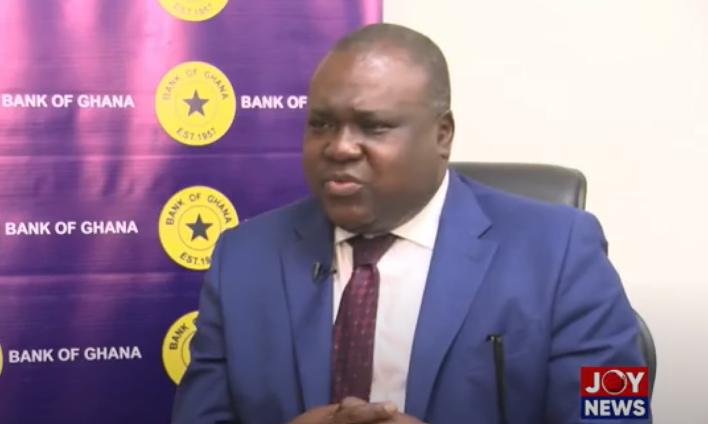
Audio By Carbonatix
The Bank of Ghana (BoG) has clarified that securing a bailout from the International Monetary Fund (IMF) would have been challenging without the implementation of the Domestic Debt Exchange Programme (DDEP).
According to the Director of Research at the central bank, Dr Philip Abradu-Otoo, the bank endured significant losses to help stabilise the country’s economy.
To address the economic challenges, the government initiated an IMF programme and introduced the DDEP, which resulted in some bondholders experiencing a reduction in their investments and coupons.
This programme was a critical step in securing the necessary support from the IMF.
In 2022, the BoG reported a loss of GHS 60.9 billion due to impairments that occurred during the domestic debt exchange programme. These impairments were a direct consequence of the financial restructuring efforts aimed at stabilising the economy.
In an interview with Citi TV, Dr. Abradu-Otoo highlighted the obstacles the government would have faced without the DDEP.
He emphasised that without the debt exchange programme, the government would have had to revisit other components of the DDEP, making the process even more challenging.
Dr. Abradu-Otoo attributed the significant losses suffered by the BoG in 2022 to the domestic debt exchange programme.
He insisted that the central bank took the biggest hit for the country, demonstrating its commitment to supporting the government's economic stabilization efforts.
“The biggest one was the impairment we had on the securities that we were holding. Just like any other individual, the BoG was also holding government securities.
"Out of that GHS 60.9 billion, GHS 48 billion of that were impairment. That is the losses that we incurred on our books, as a result of the DDEP.
He emphasised, “For the debt exchange programme, nobody had a haircut on the principal…for the BoG, we had the side haircut, and top haircut and the amount itself was cut into two.
"We had three, we had to do that because we needed that to secure the IMF programme. It would have been tough to move forward very fast. Then we would have come back to the drawing board and relook at the other parts of the DDEP," he said.
Latest Stories
-
Beyond certificates: Why Ghana’s TVET revolution must prioritise employment over enrolment
1 minute -
Miss Intercontinental Ghana winner sues organisers after title withdrawal
15 minutes -
Bioko has truly redefined my appreciation of locally made chocolate and the power of a woman’s vision
18 minutes -
Ghana moves to open key public offices to dual citizens in historic constitutional review
37 minutes -
Punishment alone won’t solve student behaviour, moral guidance needed – Irene Sam
42 minutes -
UK launches eVisas for Nigerians as US expands short-term travel access in Ghana
45 minutes -
Viral fame vs traditional education in the republic of uncommon sense
51 minutes -
SHS assault: Education Ministry must do more than request investigations – Dr Peter Anti
56 minutes -
What’s going on — How we can create instead of waiting for jobs
1 hour -
Shisha, cigarette smoking fuels breast cancer in Ghana – Dr Beatrice Wiafe sounds alarm
1 hour -
Stephen Donkor: Ghana’s conscience in question
1 hour -
At least 25 soldiers dead in attacks after raid on Mexico’s most wanted cartel leader
1 hour -
Church of Stories returns with new audio drama series, ‘The Gold Coast Darlings’
1 hour -
We will leave no stone unturned – IGP vows crackdown after arrest of robbery gang
1 hour -
TRRS celebrates unprecedented success in Queen’s Commonwealth Essay Competition
1 hour

